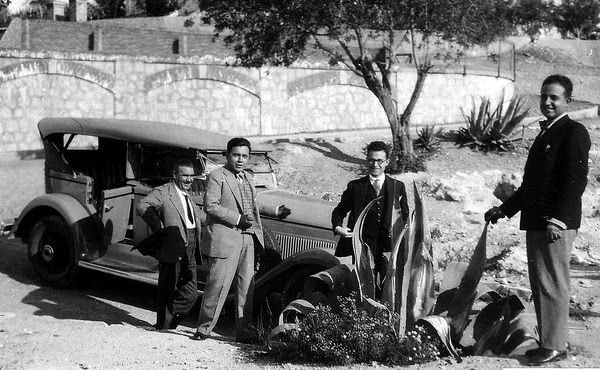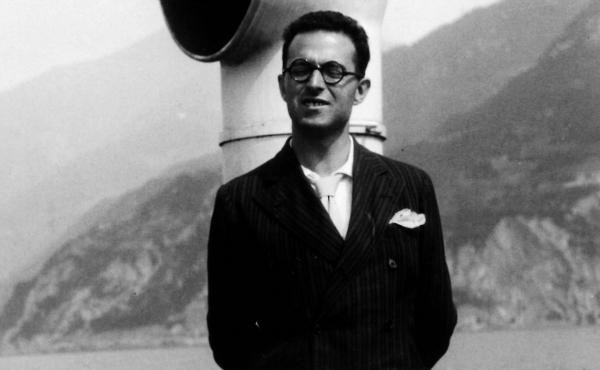On December 14, 1928, Isidoro moved from Cadiz to Malaga, to work in the Andalusian Railroad Company. Shortly after starting his new job, he wrote to his old high school friend, Saint Josemaría Escrivá: “My dear friend: As you can see, I am now in Malaga, as I have switched from the Naval Construction Company to the Andalusian Railroad Company, where I provide my services as junior engineer in the electrical service” (letter to Saint Josemaría, January 4, 1929).
In his new position, he worked in the electrification project for several railway lines. He showed such promise that his immediate boss, also director of the Industrial School, suggested he be named professor of Electronics and Mathematics at this center.
His professional situation was thus going quite well. Isidoro also had a number of relatives and friends in Malagua, and the local marriageable girls began to take an interest in the young engineer as a good “catch” for a husband. The possibility of matrimony was even raised with some Argentine cousins who came to visit him.

But Isidoro felt an inner unease. He thought that his first duty was to guarantee the situation of his mother and sister. At the same time, without knowing why, he began to consider whether God expected something more from him. He opened his heart to a close friend, who suggested that he might look into the religious life. But he decided not to pursue this possibility since he saw that God had granted him a clear professional vocation as an engineer.
On August 23, 1930, Isidoro left Malaga for Logroño, where he planned to spend a few days with his family. He decided to stop in Madrid, since several weeks before he had received a card from Saint Josemaría which said: “Dear Isidoro: When you come to Madrid be sure to come to see me. I have some very interesting things to tell you. A hug from your good friend” (Saint Josemaría, notes from a family gathering, August 24, 1947). Isidoro replied by return post: “I hope to go soon … perhaps at the end of the month, in which case it goes without saying that my first visit will be to you" (letter to Saint Josemaría, August 19, 1930 ).
So on August 24, when he arrived in Madrid, Isidoro went right to the home of the founder of Opus Dei, only to discover that Saint Josemaría, who hadn’t been informed of his arrival, had gone to visit a sick person. So Isidoro decided to have lunch at Puerta del Sol while waiting for the next train to Logroño. Nevertheless, although he wasn’t sure why, something told him that he should go for a walk around the neighborhood.
At the same time, Saint Josemaría also felt uneasy while visiting the sick person, which led him to say goodbye as soon as possible and return home, taking a different route than usual. On Nicasio Gallego Street, the two friends ran into one another.
Later, when reflecting on these “coincidences,” they both agreed it was due to the intervention of Our Lady and the Apostle Saint Bartholomew, whose feast was celebrated that day.
Isidore told the founder of Opus Dei that, for a long time, he had felt that God was asking him for a total dedication in a way that was compatible with his professional vocation and with his obligation to help support his family.
Saint Josemaría spoke to him about what God had made him “see” on October 2, 1928: Opus Dei as a path of sanctification for ordinary Christians, called to give themselves to God and to carry out apostolate in the midst of the world and their ordinary tasks. Without changing their state, it meant striving to convert their work and ordinary life into the material for their personal sanctification, into a place for encountering Christ, into an opportunity to serve the Church and all souls, into an instrument to Christianize all sectors of society: labor relations, the university, the arts, the press, family life...
Isidoro's reaction to this scenario, so well suited to his own desires, was enthusiastic. He immediately understood that it was a divine call: “The finger of God is here. And here I am. That’s all that’s needed!” “I now know why I have come to Madrid” (Blessed Alvaro del Portillo and A. Rodriguez Vidal, Apuntes para un perfil biográfico de Isidoro Zorzano Ledesma, p. 316; and Saint Josemaría, Apuntes íntimos, no. 85).
Several hours later, on the train once again to Logroño, Isidoro reflected on the horizons that his friend had opened up for him. Once again he was certain that this “was precisely the ideal” he was looking for “and that he had thought unattainable because it meant combining factors that were quite diverse” (letter to Saint Josemaría, September 5, 1930).
A few days later, back in Malaga, he wrote: “I have thought a lot about it and every day it seems more beautiful to me. My only desire is to cooperate in making this ideal a reality” (letter to Saint Josemaría, September 5, 1930). “I see that I owe everything to the Work of God” (letter to Saint Josemaría, September 14, 1930).
This is how Isidore discovered God’s call to the Work, for which He had been preparing him for many years. The conversation in which he decided to give himself completely to God within Opus Dei, was the beginning of a “new era” in his life (letter to Saint Josemaría, September 5, 1930) “I am now completely at ease. My heart is filled with a well-being, a peace that I have never felt before” (letter to Saint Josemaría, September 14, 1930).
